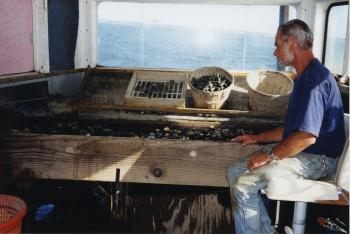Bob Slager

Long Island Traditions
Folklorist Nancy Solomon has documented the maritime culture of Long Island through these interviews spanning the years 1987 – 2016. The collection includes baymen, fishermen, boat builders and other maritime tradition bearers.
On July 16, 2000 Steve Warrick interviewed Robert Lowell Slager for the Long Island Traditions oral history project. Bob followed in the footsteps of his father, and started dredging clams at the age of 16. Bob provides details about his life as a clam dredger and the changing nature of the bay, including the sharp drop in clam populations due, in part, to pollution, as well as the shift from primarily seeing commercial boats to pleasure boats. He describes the equipment he uses, the techniques he's developed over the years, and his thoughts on the future of clamming in West Sayville. Bob says of the people who work the bay, "they are...a hardworking bunch of people. They see the livelihood that they had, which is slowly drifting away. Many of them are still willing to stick to it. I haven’t seen anybody thumb their nose at the bay. Everyone that’s ever been out there says, 'I wish I could go back to it.' I think that pretty much sums it up. Everybody who’s ever been out there’s said, 'I wish I could go back, but I just can’t.”
Please Note: The oral histories in this collection are protected by copyright and have been created for educational, research and personal use as described by the Fair Use Doctrine in the U.S. Copyright law. Please reach out Voices@noaa.gov to let us know how these interviews are being used in your research, project, exhibit, etc. The Voices staff can help provide other useful resources related to your inquiry.
The NOAA mission is to understand and predict changes in climate, weather, oceans, and coasts, to share that knowledge and information with others, and to conserve and manage coastal and marine ecosystems and resources. The Voices Oral History Archives offers public access to a wide range of accounts, including historical materials that are products of their particular times, and may contain offensive language or negative stereotypes.
Voices Oral History Archives does not verify the accuracy of materials submitted to us. The opinions expressed in the interviews are those of the interviewee only. The interviews here have been made available to the public only after the interviewer has confirmed that they have obtained consent.
